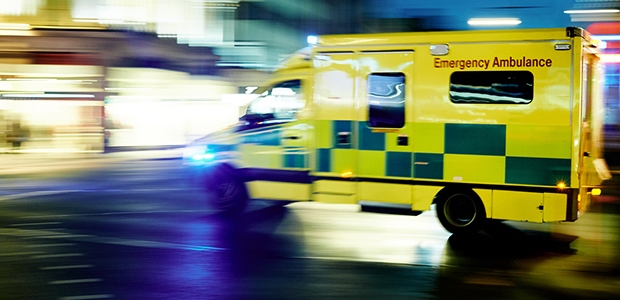
NHS England Commits to Faster Ambulance Response to Critical Cases
The performance targets announced this month will apply to all 999 emergency calls and aim to save 250 cardiac arrest victims' lives a year.
NHS England announced a new set of performance targets July 13 for the ambulance service that will apply to all 999 emergency calls for the first time. The agency says this will result in faster treatment and save 250 cardiac arrest victims’ lives per year.
Up to 750,000 more calls per year will get an immediate response, and the changes will remove long waits suffered by millions of patients, including reducing lengthy waits for the frail and elderly, according to NHS England. They result from the world's largest clinical ambulance trial. Academics at Sheffield University found that the changes are safe, with no safety issues identified in more than 14 million 999 calls handled during the 18-month trial.
Currently, half of all ambulance calls -- around 5 million annually -- are classed as "green" and not covered by any national target. Response times for these patients, who are often frail and elderly, have been under pressure, with some patients waiting six hours or more, NHS England said. The changes also will benefit patients in rural areas.
The new system is backed by the Association of Ambulance Chief Executives, the Royal College of Emergency Medicine, the Stroke Association, and the British Heart Foundation.
Ambulances will now be expected to reach the most seriously ill patients in an average time of seven minutes. Currently, three or even four vehicles may be sent to the same 999 call to be sure of meeting the eight-minute target, meaning that across the country one in four dispatched vehicles are stood down before reaching their destination.
NHS England is introducing condition-specific measures that will track time from 999 call to hospital treatment for heart attacks and strokes, where a prompt and appropriate response is particularly critical. By 2022, it expects 90 percent of eligible heart attack patients will receive definitive treatment (balloon inflation during angioplasty at a specialist heart attack center) within 150 minutes, and nine out of 10 stroke patients should also receive appropriate management within 180 minutes of making a 999 call. (That currently happens for less than 75 percent of stroke patients.) Data collection will begin immediately.
"Patients across the country deserve to benefit from the significant improvements seen in the trial areas, from ambulances reaching cardiac arrests in London 30 seconds faster to the one-minute improvement on stroke responses in the West Midlands. These changes, together with ambitious new clinical standards for heart attack and stroke patients, will end the culture of 'hitting the target but missing the point,'" said Sir Bruce Keogh, NHS England's National Medical Director, who commissioned the Ambulance Response Programme trials in 2015. "They will refocus the service on what actually counts: outcomes for patients."
"Our core priority will always be patient safety, but paramedics are rightly frustrated that under the current 'stop the clock' system they are frequently dispatched to simply hit targets. This has led to the inefficient use of ambulances, with the knock-on effect of 'hidden waits,'" said Professor Keith Willett, NHS England's medical director for acute care. "This is not about relaxing standards, but updating a decades-old system to respond to modern needs. In most 999 calls we know the best clinical outcome for patients is not about the fastest response by the nearest vehicle, but the most appropriate one. These are changes which have been called for by paramedics, and the evidence shows that they will save lives."
Anthony Marsh, chief executive of the West Midlands Ambulance Service that took part in the ambulance response trials, said since instituting the changes, their ambulances "are now reaching stroke patients a minute quicker than before, helping them get to hospital and receive vital treatment as rapidly as possible. Response times fell across all of our response categories during our involvement in the trial, and we have no doubt that implementing these changes has significantly improved the service we can offer our patients."
"The changes to the Ambulance Response Programme's system of call prioritization are to be welcomed and will help save lives. Slightly extending the initial time in which call handlers must assess the urgency of the situation will allow for a better diagnosis of the problem without reducing the speed of response to those most in need of urgent medical attention," said Taj Hassan, president of the Royal College of Emergency Medicine. "Response times will be more appropriate according to the patient’s need, and trials have suggested that ambulances could arrive up to three minutes quicker to the most serious incidents – time which can make the difference between life and death. For instance, in a scenario where only one ambulance is available to respond, taking a few more seconds to assess the situation could make sure that we are not sending that ambulance immediately to someone with a broken leg, when it could be going to someone who may be bleeding out and in need of critical care. By using the new system nationally, NHS England have calculated that there will be up to 14,500 occasions each week in England where an additional ambulance is freed for response to the most serious of cases, which will ensure that those in most need get to an emergency department quicker. It is especially pleasing to see that the approach taken to development has been so well structured, methodical, and evidence based. It has produced a new system that will truly add to the number of lives saved in those precious early few minutes following a 999 call."